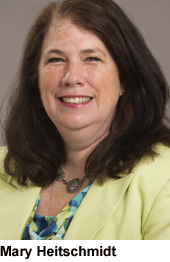Engaging educators to mentor clinicians fosters scholarship for both.

More than 50 years ago, my parents emigrated from Ireland to the United States, where they were mentored on how to survive, settle, and raise a family in their new country. Later this month, I will be presenting at the 28th International Nursing Research Congress in Ireland, where I will talk about how mentoring can help nurse faculty members engage in interprofessional project teams. Humbled and proud to have been selected as a presenter, I feel a full-circle connection to where my family’s history started and welcome my chance to “come home.”
Multiple roles include mentoring
 I am currently director of clinical research, assistant professor of nursing, and assistant director of the Center for Clinical Research and Scholarship (CCRS) at Rush University System for Health (RUSH), Chicago, Illinois, USA. CCRS is housed in the Rush University College of Nursing. In addition to CCRS, my multiple roles relate to Rush University Medical Center (RUMC)—a major teaching hospital—and Rush Oak Park Hospital (ROPH), a community hospital in Oak Park, Illinois. I work with Angelique L. Richard, PhD, RN, chief nursing officer at RUMC, and Karen M. Mayer, PhD, vice president of patient care services at ROPH, to strategize priorities for clinical research for nursing.
I am currently director of clinical research, assistant professor of nursing, and assistant director of the Center for Clinical Research and Scholarship (CCRS) at Rush University System for Health (RUSH), Chicago, Illinois, USA. CCRS is housed in the Rush University College of Nursing. In addition to CCRS, my multiple roles relate to Rush University Medical Center (RUMC)—a major teaching hospital—and Rush Oak Park Hospital (ROPH), a community hospital in Oak Park, Illinois. I work with Angelique L. Richard, PhD, RN, chief nursing officer at RUMC, and Karen M. Mayer, PhD, vice president of patient care services at ROPH, to strategize priorities for clinical research for nursing.
Charged with developing and leading internal programs to support RUSH nursing, clinical research, and scholarship missions, I am privileged to mentor, role model, and guide exemplary clinical professionals in their research and evidence-based practice activities. I work collaboratively with other healthcare professionals to nurture a culture of clinical inquiry that improves patient care outcomes. My responsibilities also include serving on the Rush internal review board (IRB), co-chairing the Professional Nursing Staff EBP/Research Committee at RUMC, consulting, and advancing educational initiatives to promote evidence-based practice and research. Every day is different and exciting.
In my previous roles as a clinical nurse specialist working with patients and families in adult and pediatric congenital cardiology, pediatric intensive care, and pediatric hematology oncology, I mentored, led, and engaged with interprofessional teams on a daily basis to improve patient care outcomes. As a member of multiple interprofessional teams that conduct human and animal research, a highlight of my work was mentoring healthcare professionals involved in research—both novice and expert. In my current role as director of clinical research, mentoring continues to be an important part of my work.
Leadership that serves
As a servant leader, I seek to empower and facilitate the growth of staff and faculty members unfamiliar with research and evidence-based practice. Servant leadership focuses on serving others, a concept known to all nurses who care for patients, either directly or indirectly. Shaped by personal experience and emotional intelligence, servant leadership seeks to “foster, nurture, and nourish” others so they can achieve their highest potential.
Servant leaders mentor others and find reward in the professional and scholarly accomplishments of those they mentor, whether the achievement is obtaining IRB approval of research work or meeting a project enrollment goal. Sometimes, the reward comes when a mentee obtains funding for a project or successfully disseminates his or her work. Although the achievements vary and often take time to be realized, it is truly a joy to witness and be a part of the process.
The interprofessional team model at Rush has been embedded in the Clinical Center for Research and Scholarship since its inception in 2007 as a partnership between the College of Nursing and Rush University Medical Center. As an assistant director of CCRS, I am truly honored to join two outstanding faculty members, Director Ruth M. Kleinpell, PhD, RN, FAAN, and Beth A. Staffileno, PhD, RN, FAHA, also an assistant director, who had the vision, passion, and system support to create such a model. Sustained with the full support of Marquis D. Foreman, PhD, RN, FAAN, dean of the College of Nursing, the model continues to expand in response to the growth of the Rush System for Health network. Mentoring clinical and advanced practice nurses engaged in collaborative multidisciplinary projects is one of many facets of professional scholarship supported and encouraged by the CCRS.
Using reflection to initiate and engage
Reflection, perseverance, and relating to others in new ways have been identified as attributes nurse faculty members need to develop individual and organizational leadership. I believe these attributes are also important for mentoring interprofessional teams. In my more comprehensive role as a faculty member, I find myself using reflection as a way to initiate and engage clinical nurses, advanced practice nurses, and faculty members of other disciplines in evidence-based practice and as participants on research-project teams. Mentoring, active listening, and persistent encouragement are needed to assist these teams in reaching their goals.
Faculty members in the Rush University College of Nursing with expertise in research methods mentor clinical staff members who have similar research interests but lack competencies needed to develop a research protocol or take on EBP projects. At the same time, CCRS faculty members provide informal mentoring to interdisciplinary teams upon request. Although commitment of some teams to project completion and dissemination of research findings waxes and wanes, it is rewarding to see improvements in the care of our patients.
Evidence-based and interprofessional
College of Nursing faculty members have collaborated with clinical nurses in advancing evidence-based practice and conducting interprofessional research projects on the following topics: 1) effects of an incentive-based exercise program on fatigue, physical functioning, and length of stay in stem-cell transplant patients; 2) improving medication adherence in the medical home model; 3) evaluation of perioperative music on patient anxiety, pain, and satisfaction levels; and 4) temperature measurement in orally intubated pediatric patients.
Engaging faculty in the College of Nursing to mentor clinical healthcare professionals fosters scholarship activities for both. To be a successful faculty mentor, there are tools you should know and share with your mentee. In my presentation at the 28th International Nursing Research Congress in Dublin, I will tell attendees more about this.
Looking back on my journey, I greatly appreciate the nursing mentor who guided my professional research trajectory. I am also grateful to my family, who instilled in me the personal values that make me who I am today. Looking forward to seeing you in Dublin!
Slán go fóill. “Bye for now.” RNL
Mary G. Heitschmidt, PhD, RN, APN, CCRN, is director of clinical research, assistant professor of nursing, and assistant director of the Center for Clinical Research and Scholarship at Rush University System for Health, Chicago, Illinois, USA.
Editor’s note: Mary Heitschmidt will present a session titled “Implementation of Faculty Clinical Research Mentorship to Improve Academic Clinical Partnerships and Nurse Led Projects” on Sunday, 30 July 2017, at the 28th International Nursing Research Congress in Dublin, Ireland. See the Virginia Henderson Global Nursing e-Repository for more information.
Other articles in this series